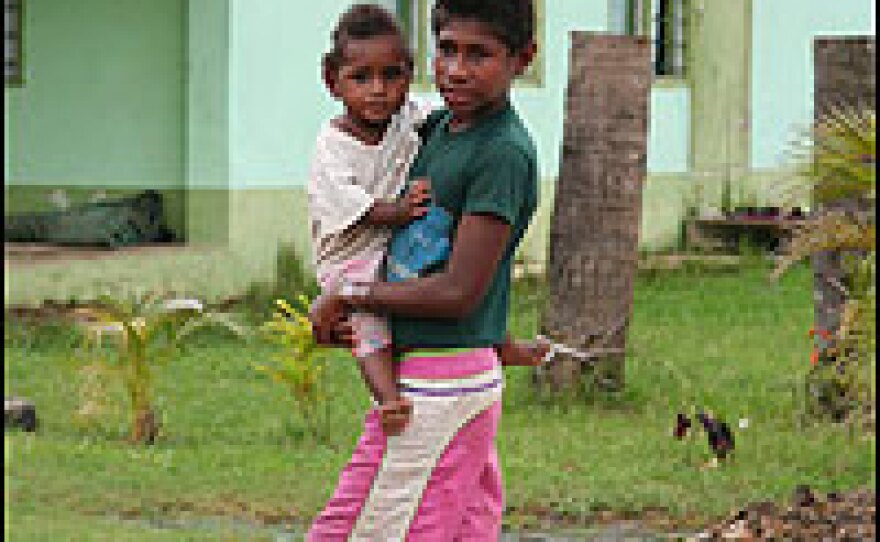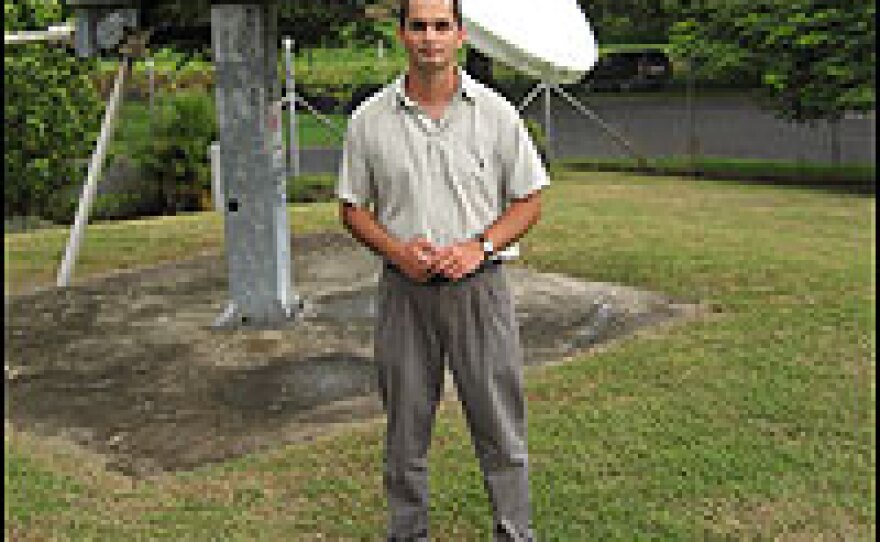

Imagine taking the state of Connecticut and breaking it up into little pieces. Then, sprinkle the bits over an area the size of Africa — and you have the island nations of the Pacific.
These islands hold both paradise and poverty. What's common to all of them, though, is their proximity to the ocean. It laps at their doorsteps, and controls their weather and food supply.
Now, that ocean is changing as the world warms. Along the coast of Fiji's big island, Viti Levu, resort hotels and small fishing villages share the same view of a wide blue Pacific; and all are noticing changes in their environment.
Kanid Kashana Koshi is director of the University of the South Pacific Center for Environment in Suva, Viti Levu's capital city.
"An average global temperature rise will definitely have a lot of secondary impacts, one of which is sea level rise," Koshi says.
So far, scientists have confirmed that average sea levels around the world have risen only slightly — a few centimeters over the last century of warming. But even a small increase can push saltwater into underground aquifers and contaminate freshwater, a resource in short supply in the Pacific Islands. Higher sea levels can also mean bigger surges during storms.
"The important effects that people have been talking about recently have been on the severity and frequency of extreme weather events, for example, extreme rainfalls that come in all of one time," says Melchior Mataki, a senior researcher at the University of the South Pacific's environment center.
Climate scientists suspect that track cyclones — the Pacific versions of hurricanes — have been slowly increasing in severity. This is a problem that island nations are hard-pressed to afford.
"The countries are already facing a lot of problems in dealing with improving the livelihood of their people," Mataki says. "And climate change coming on top of it will certainly put them in a more precarious situation."
Religion is another obstacle to addressing climate change, as many people on the islands are devoutly Christian.
Fijian scientists say they sometimes have trouble convincing citizens that humans can actually change the climate. Simon McGree, the chief climate scientist at the Fijian Meteorological office, keeps an editorial cartoon pinned up in his office. It shows a child on the island of Kiribati asking his father whether the island is sinking or the sea level is rising. The cartoon suggests that the will of God will save the islanders — sink or swim.
"Many islanders are staunch Christians," McGree says. He and other scientists try to convince them with as much data as possible. "You can't argue with data," he says.
The atmosphere in the Pacific has clearly warmed, according to the Met office's data and so have ocean temperatures. Rainfall patterns have also changed.
The cause is uncertain. Nonetheless, Fijians are asking McGree for answers. He says the science isn't strong enough to make predictions about Fiji, but he can't help noticing changes in his own home town of Sigatoka.
"We used to live right on the beach and over the 14 years, well, I would come home during the school holidays and notice that we had lost quite a bit of land," says McGree.
Diane McFadzien helped establish the World Wildlife Fund's climate witness program in the region, which recruits people around the world to watch for unusual changes in weather and sea level. McFadzien recently talked to people on the Fijian island of Kumbara.
"On this island, there are no freshwater streams. They rely 100 percent on rainwater as the only source of drinking water," McFadzien says, "and they were talking about the fact that there seems to be a lot less drinking water around."
McFadzien, a native of the Cook Islands, found that rainfall has been declining in that part of the Pacific. She says people live close to the sea and know the weather patterns well. She also says they know they're not producing the greenhouse gases that are warming the planet.
Scientists are just now trying to figure out what climate change is doing to the Pacific. The Global Environment Facility and Investment Fund is supporting research in that area, and scientists from universities and environmental groups are spending more time in the Pacific, studying coral reefs, mangrove forests and the ocean itself for signs of change. In the meantime, people like McFadzien are trying to prepare.
"I think I would be crazy to own property on the beach. I've just bought a piece of land myself and it's very up high on the hill, so that's kind of a change," she explains.
McFadzien may sound upbeat at the moment but she knows that heading for the hills may someday be her only option, short of leaving her island altogether.
Produced by Jessica Goldstein
Copyright 2022 NPR. To see more, visit https://www.npr.org. 9(MDAzMjM2NDYzMDEyMzc1Njk5NjAxNzY3OQ001))






